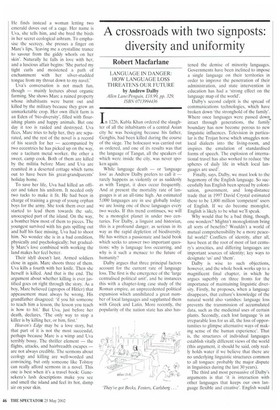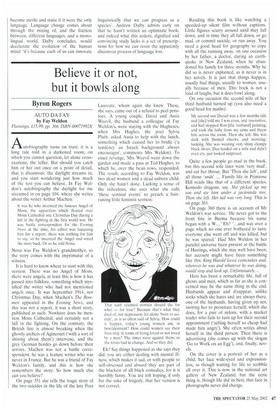A crossroads with two signposts: diversity and uniformity
In 1226, Kubla Khan ordered the slaughter of all the inhabitants of a central Asian city he was besieging because his father, Genghis, had been killed during the course of the siege. The holocaust was carried out as ordered, and one of its results was that the language of Tangut, all the speakers of which were inside the city, was never spoken again.
While language death — or 'language loss' as Andrew Dalby prefers to call it — rarely happens as violently or as suddenly as with Tangut, it does occur frequently. And at present the mortality rate of languages is at an all-time high. An estimated 5,000 languages are in use globally today: we are losing one of these languages every two weeks. If this trend continues, we will be a monoglot planet in under two centuries. For Dalby, a linguist and historian, this is a profound danger, as serious in its way as the rapid depletion of biodiversity. He has written a passionate and lucid book which seeks to answer two important questions: why is language loss occurring, and why is it such a menace to the future of humanity?
Dalby argues that three principal factors account for the current rate of language loss. The first is the emergence of the 'large centralised political unit', and he instances this with a chapter-long case study of the Roman empire, an unprecedented political expansion which annihilated a great number of local languages and supplanted them with Greek and Latin. More recently, the popularity of the nation state has also has tened the demise of minority languages. Governments have been inclined to impose a single language on their territories in order to improve the penetration of their administration, and state intervention in education has had a 'strong effect on the language map of the world'.
Dalby's second culprit is the spread of communications technologies, which have broken down 'the stronghold of the family'. Where once languages were passed down_ intact through generations, the family boundary has now become porous to new linguistic influences. Television in particular is the Trojan horse which smuggles nonlocal dialects into the living-room, and inspires the emulation of standardised forms of speech. The explosion of international travel has also worked to reduce 'the spheres of daily life in which local languages are used'.
Finally, says, Dalby, we must look to the hegemony of the English language. So successfully has English been spread by colonisation, government, and long-distance trade that in 1997 David Crystal estimated there to be 1,800 million 'competent' users of English. If we do become monoglot, English is likely to be what we'll speak.
Why would that be a bad thing, though, one wonders? Mightn't monoglottism bring all sorts of benefits? Wouldn't a world of mutual comprehensibility be a more peaceful world? Conflicts of identity, after all, have been at the root of most of last century's atrocities, and differing languages are important sources of identity; key ways to designate 'us' and 'them'.
Dalby is wise to such objections, however, and the whole book works up to a magnificent final chapter, in which he argues superbly on three fronts for the importance of maintaining linguistic diversity. Firstly, he proposes, when a language disappears, that culture's knowledge of the natural world also vanishes: language loss prevents the transmission of accumulated data, such as the medicinal uses of certain plants. Secondly, each lost language 'is an irreparable loss for us all, the loss of opportunities to glimpse alternative ways of making sense of the human experience'. That is, the structures of individual languages establish vitally different views of the world (this argument, it should be said, only really holds water if we believe that there are no underlying linguistic structures common to all tongues: probably the major dispute in linguistics during the last 30 years).
The third and most persuasive of Dalby's arguments is that 'it is interaction with other languages that keeps our own language flexible and creative'. English would become sterile and static if it were the only language. Language change comes about through the mixing of, and the friction between, different languages, and a monolingual world, Daby concludes, would decelerate the evolution of the human mind: 'it's because each of us can innovate linguistically that we can progress as a species'. Andrew Dalby admits early on that he hasn't written an optimistic book, and indeed what this ardent, dignified and convincing study lacks is a set of prescriptions for how we can resist the apparently disastrous process of language loss.























































































 Previous page
Previous page